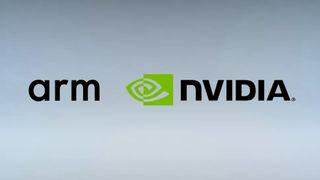Nvidia argues it should be allowed to buy Arm because Intel and AMD are really, really good
"No industry observer can seriously contend that Intel, AMD, and Arm’s other competitors are so incapable that they cannot even compete with Arm."

You might think Nvidia, Intel, and AMD are all at each other's throats, and if you look to their marketing, well, you'd be correct in thinking that most of the time. But they're also companies that rely on each other's tech a whole lot, especially when it comes to complementary devices, such as gaming laptops, and even supercomputers.
Look to CES 2022 and you'll find plenty of laptops brandishing an AMD CPU alongside an Nvidia GPU, or an Intel CPU with an Nvidia GPU. Maybe even the odd AMD GPU in the mix as well. But what's especially fascinating is how Nvidia's referencing this complementary relationship as one reason why it should be allowed to buy UK-based chipmaker Arm for $40 billion.
One of the main concerns raised against Nvidia's Arm deal is that it would be damaging to competition in chipmaking and design. What is referred to as the "ability to foreclose competition" in a recent Nvidia and Arm document published to the UK Government website.
In some ways, that means the Nvidia and Arm deal is scrutinised for its ability to impact Nvidia's main competitors, Intel and AMD. And that's where things get interesting for us PC gamers, and surprisingly complementary for Nvidia's rivals.

Best VR headset: which kit should you choose?
Best graphics card: you need serious GPU power for VR
Best gaming laptop: don't get tied to your desktop in VR
"The Decision disparages Intel, AMD, and hundreds of RISC-V supporters as forever unable to compete with Arm," the argument reads.
"No industry observer can seriously contend that Intel, AMD, and Arm’s other competitors are so incapable that they cannot even compete with Arm. Intel and AMD are the industry leaders, not also-rans. Nvidia has chosen x86 for its DGX and its supercomputers for good reason. Intel and AMD’s CPUs are not going anywhere, and they will compete with Arm for the foreseeable future."
Nvidia does rely on AMD's x86 products for quite a few of its own, as it requires high performance CPU power and AMD's EPYC chips deliver it. Both companies rule the x86 roost, and it really would take some serious processor power, be that from Arm-based devices or otherwise, to budge them from it. It's still just so odd to see Nvidia so complementary on paper.
The biggest gaming news, reviews and hardware deals
Keep up to date with the most important stories and the best deals, as picked by the PC Gamer team.
Within their arguments, Nvidia and Arm also highlight how especially significant Intel's influence is, and explain how there's no way it's taking down Intel easily even with their combined strength. They also offer some stern words to those looking to Nvidia's competitors for their opinion on the Nvidia-Arm deal, and you wouldn't expect any less.
"Antitrust law preserves competition—it does not empower customers and competitors with veto rights over acquisitions."
Quite a thought from Jen-Hsun Huang's side on AMD and Intel, then, but one that Nvidia needs to make in earnest to have a chance of finalising its Arm purchase. The company is facing serious opposition to its Arm deal, and proving its combined mass wouldn't be of such danger to competition is key to Nvidia and Arm's eventual togetherness, should it ever come to pass.

Jacob earned his first byline writing for his own tech blog. From there, he graduated to professionally breaking things as hardware writer at PCGamesN, and would go on to run the team as hardware editor. He joined PC Gamer's top staff as senior hardware editor before becoming managing editor of the hardware team, and you'll now find him reporting on the latest developments in the technology and gaming industries and testing the newest PC components.
Most Popular






